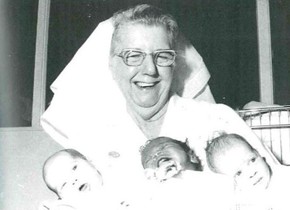LOVE, Ida Dorothy
| Service Number: | NX131311 |
|---|---|
| Enlisted: | 29 September 1942 |
| Last Rank: | Lieutenant |
| Last Unit: | Not yet discovered |
| Born: | Orange, New South Wales, Australia, 13 November 1908 |
| Home Town: | Sydney, City of Sydney, New South Wales |
| Schooling: | Not yet discovered |
| Occupation: | Matron, Crown Street Womens Hospital |
| Died: | Castle Hill, New South Wales, Australia, 10 May 1990, aged 81 years, cause of death not yet discovered |
| Cemetery: | Not yet discovered |
| Memorials: |
World War 2 Service
| 29 Sep 1942: | Enlisted Australian Military Forces (WW2) , Lieutenant, NX131311 | |
|---|---|---|
| 6 Sep 1947: | Discharged Australian Military Forces (WW2) , Lieutenant, NX131311 |
Ida Dorothy Love
Australian Dictionary of Biography. Volume 18, 2012 (Melbourne University Press).
Ida Dorothy Love, (1908-1990), nurse and midwifery educator, was born on 13 November 1908 at Orange, New South Wales, eldest of four children of Matthew Henry Love, railway engineer, and his wife Edith Eleanor, née Lillyman, both born in New South Wales. The family moved to Sydney where Ida attended Fort Street Girls’ High School; she was denied her choice of a teaching career as commitments kept her at home.
In 1931 Love began training as a nurse at the Royal Alexandra Hospital for Children. Work (1935) as a staff nurse at the Alfred Hospital, Melbourne, was followed by some private nursing, and a year at the Melbourne Bible Institute to prepare for medical missionary nursing in India. In 1938 she studied midwifery at the Royal South Sydney Women’s Hospital. Prevented by the outbreak of World War II from becoming a missionary, she worked as a staff nurse (1939-41) at the Royal Hospital for Women, Paddington, and as a tutor sister (1941-42) at King George V Memorial Hospital, Camperdown. On 11 August 1942 Love was mobilised in the Australian Army Nursing Service. Appointed as a lieutenant in the Australian Imperial Force next month, she served in military hospitals in Australia and, in 1945, with the 2/1st Australian General Hospital on Bougainville. She transferred to the reserve in September 1947.
Love joined the Women’s Hospital, Crown Street, as a tutor sister that year, and attended the Tresillian North Mothercraft Training School, Willoughby. In 1949 she travelled to London and, while working at Queen Charlotte’s Hospital, gained the midwives’ teacher’s diploma issued by the Central Midwives Board. For a few months she worked at the Simpson Memorial Maternity Pavilion, Edinburgh, observing the teaching methods of Margaret Myles, author of the classic Textbook for Midwives.
Back in Sydney in 1951, Love returned to Crown Street as a tutor sister, soon with sole control of midwifery training. She was appointed matron in 1963. In 1965 she visited the United States of America, Britain and Europe, and attended the Congress of the International Council of Nurses in Frankfurt, Germany.
A member (1947) of the New South Wales Midwives Association, Love also lectured, examined, gave graduate addresses, wrote articles for nursing journals and served (1956-73) on the Nurses’ Registration Board of New South Wales. She was a member of the councils of the Australasian Trained Nurses’ Association (1959-74), the New South Wales Bush Nursing Association and the Nurses’ Christian Movement (Fellowship). For her work in training voluntary aids in home nursing, she received the Red Cross distinguished service award in 1961. She was awarded the British Empire Medal in 1974. The Women’s Hospital, Crown Street, named its school of nursing in her honour in 1979.
Ida Love’s warmth and compassion were combined with a strong faith. A book of devotions that she kept from youth grew daily as she added new thoughts. Never married, she considered the hospital community to be a family. In retirement (from 1974) she lived for some years with her brother and sister at St Ives, gardened, travelled and remained active in community organisations. She died on 10 May 1990 near her home at Mowll Village, Castle Hill, and was cremated.
Submitted 15 March 2022 by John Gillies









